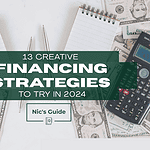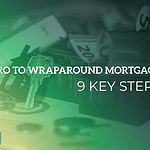If you want to buy a property but don’t want to use a conventional mortgage or don’t have funds for a down payment, a purchase money mortgage is a creative financing strategy you can use.
As a real estate investor, a purchase money mortgage is one of the many creative options available to me that I use to buy property. The first properties my husband and I bought in 2000 used seller financing on homes that a local university owned.
This guide will talk about the definition of purchase money mortgage, benefits and drawbacks, and other alternatives you can use.
Here are the key takeaways:
- A purchase money mortgage is a seller-fiancing loan provided by the property owner or seller.
- Real estate investors sometimes use purchase money loans when they have a low credit score, a high debt-to-income (DTI) ratio, or an insufficient down payment to cover the purchase price.
What is a Purchase Money Mortgage?
Purchase money mortgage has many names like seller financing, owner’s loan, seller’s loan, or owner financing. It all boils down to a single definition — it’s a loan that the property owner/seller gives to the buyer as part of the purchase transaction.
This mortgage is very common in situations where the buyer’s qualifications do not meet the standards of financial institutions such as banks. Or – if the property won’t qualify for a traditional mortgage. But it’s also a creative financing strategy for real estate investors.
The seller functions as the “bank” and sets up the down payment and closing fee requirements, as well as interest rates.
Once the buyer pays the down payment, they sign an executed financing instrument that outlines the loan details. To protect the interests of both the buyer and the seller, The financing instrument is publicly recorded within the issuing county– much like a conventional mortgage.
3 Reasons Why You Need to Know Purchase Money Mortgages
Whether you’re a potential homebuyer, a real estate investor, or someone interested in the intricacies of real estate transactions, knowing about purchase-money mortgages can be beneficial for several reasons.
Here are three reasons you might want to understand purchase money mortgages:
Flexible Down Payment
A purchase-money mortgage is a far cry from traditional mortgages.
Since some properties need a large down payment and usually have a lot of risks involved, most banks do not want to finance potential buyers and turn them away.
However, in a purchase money mortgage, sellers set the down payment requirements and dictate prices to however high or low they want — giving as much wiggle room as potential buyers need.
Inclusive Loan Options
Seller financing has a more lenient underwriting process since they want to sell the home quickly and help buyers out regardless of their qualifications, which makes it possible to sell the property sooner.
Most borrowers use purchase-money mortgages when:
- have a high Debt-to-Income (DTI) ratio – like if they’ve already maxed out the number of rental properties they can buy with traditional mortgages.
- they don’t qualify for bank financing, or the property doesn’t qualify
- they have a small down payment
Quicker and Lower Closing Fees
By not going through a traditional lender, sellers cut out the middleman since they handle the loans themselves.
This way, buyers can save time since loans are often closed in a week or two depending on requirements and money on closing costs since sellers generally charge lower than the standard closing costs, around 2% – 6% of the total loan amount.
Types of Purchase Money Mortgages
Here are the three types of purchase money loans:
1. Land Contract
A land contract represents a mortgage arrangement provided by the seller. The seller can have an existing mortgage or own the property free and clear.
In both scenarios, a land contract is set up when the buyer and seller agree on a down payment, interest rate, and payment schedule. The buyer then pays the seller per the agreed terms until full payment.
When the buyer completes the final payment, the seller transfers the property’s legal title (and full ownership) to the buyer.
2. Lease Option Agreement
A lease option agreement combines a rental arrangement with the potential to purchase the property either during or after the lease period.
In the transaction, the buyer and seller establish the specifics of the lease and the opportunity to buy the property. Lease options previously could apply a portion of the monthly rent to serve as a down payment for the future purchase of the property, but with the Dodd-Frank Act in 2010, this is no longer legal.
Check out Bill Bronchick’s video on how Dodd-Frank impacts real estate investors. Fun fact – my husband and I first learned creative real estate financing strategies like lease options and subject-to at Bill’s seminar in the early 2000s. His perspective on how legislation affects creative real estate investing is insightful.
3. Lease-Purchase Agreement
A lease-purchase agreement allows a renter to rent a property with the option to buy it at a specified future date. The renter pays an option fee to secure the exclusive right to purchase the property.
However, if the renter cannot obtain financing to complete the purchase, they typically forfeit the option fee. I have used lease-purchase agreements for my single-family rental properties in the past.
Should You Go With A Purchase Money Mortgage?
It depends on what side you’re on. Here’s a perspective from both sides:
For Buyers
Buyers can think of purchase money loans as an alternative to traditional financing.
Not only are they more lax with buyer qualifications, interest rates, and closing costs that are tailored to the buyer’s needs and seller’s judgment, but there are also several payment options available to them, such as interest-only, fixed-rate amortization, and balloon payments.
Down payments are also flexible. If a buyer has insufficient funds to make a down payment, they can negotiate with the seller and make periodic monthly or lump sum payments towards one.
With these factors in mind, purchase money loans lead to a quicker close and an earlier ownership than conventional mortgages.
The first commercial apartment complex that my husband and I bought was through seller financing. Our structure was interest-only with a 3-year balloon. Once the property was cash-flowing, we refinanced with a traditional lender before the end of the three years.
For Sellers
When offering a purchase-money mortgage, the seller has the potential to receive the full list price (or even more) for the property.
Additionally, this approach may lead to reduced tax liability through an installment sale. Buyer payments can contribute to an improved monthly cash flow for the seller, resulting in increased disposable income.
Sellers may secure a higher interest rate than in a money market account or other low-risk investments.
Alternatives to Purchase Money Mortgages
Now that we have the definition of purchase money loans, its types, and advantages, let’s look at other alternatives you can use:
Hard Money Loan
Hard money loans are often used by house flippers because financing can be set up very quickly – usually in days.
Hard money loans are typically facilitated through banks or other financial institutions and are primarily based on the property’s equity, with the buyer’s credit rating playing a significant factor.
These loans are riskier, and the hard money lender faces the potential of the buyer being unable to repay the loan. In such cases, the property is taken over by the hard money lender.
Here’s a table to compare them:
| Purchase Money Mortgage | Hard Money Loan |
| Financed through the seller/owner | Financed through traditional methods like a bank loan |
| Approval can be slow depending on the requirements | Approval is quicker |
| Terms and requirements are based on the seller’s existing mortgage or when needed, the buyer’s credit report | Terms based on collateral such as the buyer’s property |
| Used by buyers who do not qualify for a conventional mortgage | Often used by buyers who need loans quickly – like property flippers |
Assumable Mortgage
When the seller has a mortgage on the property with more favorable terms than what’s typically available for new mortgages at the time of the home’s purchase, it creates an opportunity for the buyer to take on the existing mortgage.
This is a great strategy right now in 2023 with the rise in interest rates. Realize that the value of a property now isn’t just its appraisal. It can also be if there is an assumable mortgage with better terms than are currently available.
This option to assume a mortgage typically applies to government-backed mortgages, such as FHA loans, VA loans, or USDA loans.
In this option, the buyer effectively steps into the seller’s shoes, taking over the loan and making payments at the same terms and interest rates. However, the buyer must meet the lender’s qualifications first.
It’s important to note that assumable and purchase-money mortgages often come with different interest rates and conditions.
My Experience With Purchase Money Mortgages
A purchase-money mortgage is a good alternative when you can’t secure traditional bank financing or when you are doing creative real estate investing.
I have been there myself. I used seller financing in the beginning. I lost a ton of money because I didn’t know how to evaluate properties or operate properties but creative financing strategy works. Now, we own hotels and generate income by syndicating deals in our investment portfolio.
Purchase money loans are just one of the options you have when owning properties. Instead, always determine which loan is best for each property and explore your options together with the seller.
FAQS
What is a purchase money mortgage example?
Imagine you want to buy a property with a $360,000 price tag, but you don’t qualify for a traditional mortgage.
You approach the seller to propose a purchase money loan and work out the down payment, interest rate, and closing fees. You both agree to a $100,000 down payment, a 7% interest rate for five years amortized for over 20 years.
Over the next five years, you have to make monthly mortgage payments (while also paying property taxes and homeowners insurance) of $1,704 while you pay around $188,000 in balloon payments over a five-year period to release the mortgage.
Do banks give purchase money mortgages?
Technically, banks, credit unions, mortgage lenders, and financial institutions CAN offer various types of purchase money mortgages, but it’s usually provided by the property owner/seller.
What are the disadvantages of purchase money mortgage?
If your property was acquired through a land contract or lease-to-own seller financing, it can be very difficult to refinance it in the future since you don’t technically own the home.
Nic
Nic is an avid real estate investor who partners with her husband on hotel syndications. Prior to hotels, she owned apartment complexes and single-family homes. Her insider expertise makes her the ideal resource for those seeking to grow their income via property investments.



